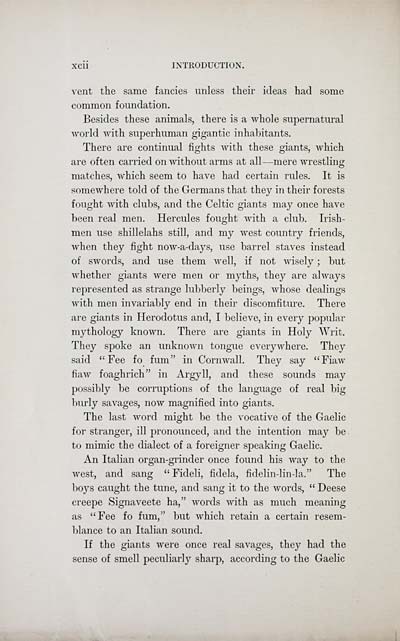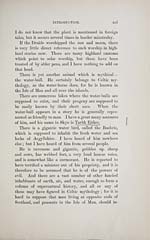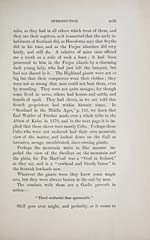Download files
Complete book:
Individual page:
Thumbnail gallery: Grid view | List view

xcii INTRODUCTION.
A^ent the same fancies unless their ideas had some
common foundation.
Besides these animals, there is a whole supernatural
world with superhuman gigantic inhabitants.
There are continual fights with these giants, which
are often carried on without arms at all — mere wrestling
matches, which seem to have had certain rules. It is
somewhere told of the Germans that they in their forests
fought with clubs, and the Celtic giants may once have
been real men. Hercules fought with a club. Irish-
men use shillelahs still, and my west country friends,
when they fight now-a-days, use barrel staves instead
of swords, and use them well, if not wisely ; but
whether giants were men or myths, they are always
represented as strange lubberly beings, whose dealings
with men invariably end in their discomfiture. There
are giants in Herodotus and, I believe, in every popular
mythology known. There are giants in Holy Writ.
They spoke an unknown tongue everywhere. They
said "Fee fo fum" in Cornwall. They say "Flaw
flaw foaghrich" in Argyll, and these sounds may
possibly be corruptions of the language of real big
burly savages, now magnified into giants.
The last word might be the vocative of the Gaelic
for stranger, ill pronounced, and the intention may be .
to mimic the dialect of a foreigner speaking Gaelic.
An Italian organ-grinder once found his way to the
west, and sang " Fideli, fidela, fidelin-lin-la." The
lioys caught the tune, and sang it to the words, " Deese
creepe Signaveete ha," words with as much meaning
as "Fee fo fum," but which retain a certain resem-
blance to an Italian sound.
If the giants were once real savages, they had the
sense of smell peculiarly sharp, according to the Gaelic
A^ent the same fancies unless their ideas had some
common foundation.
Besides these animals, there is a whole supernatural
world with superhuman gigantic inhabitants.
There are continual fights with these giants, which
are often carried on without arms at all — mere wrestling
matches, which seem to have had certain rules. It is
somewhere told of the Germans that they in their forests
fought with clubs, and the Celtic giants may once have
been real men. Hercules fought with a club. Irish-
men use shillelahs still, and my west country friends,
when they fight now-a-days, use barrel staves instead
of swords, and use them well, if not wisely ; but
whether giants were men or myths, they are always
represented as strange lubberly beings, whose dealings
with men invariably end in their discomfiture. There
are giants in Herodotus and, I believe, in every popular
mythology known. There are giants in Holy Writ.
They spoke an unknown tongue everywhere. They
said "Fee fo fum" in Cornwall. They say "Flaw
flaw foaghrich" in Argyll, and these sounds may
possibly be corruptions of the language of real big
burly savages, now magnified into giants.
The last word might be the vocative of the Gaelic
for stranger, ill pronounced, and the intention may be .
to mimic the dialect of a foreigner speaking Gaelic.
An Italian organ-grinder once found his way to the
west, and sang " Fideli, fidela, fidelin-lin-la." The
lioys caught the tune, and sang it to the words, " Deese
creepe Signaveete ha," words with as much meaning
as "Fee fo fum," but which retain a certain resem-
blance to an Italian sound.
If the giants were once real savages, they had the
sense of smell peculiarly sharp, according to the Gaelic
Set display mode to: Large image | Transcription
Images and transcriptions on this page, including medium image downloads, may be used under the Creative Commons Attribution 4.0 International Licence unless otherwise stated. ![]()
| Early Gaelic Book Collections > Matheson Collection > Popular tales of the west Highlands > Volume 1 > (112) |
|---|
| Permanent URL | https://digital.nls.uk/81388572 |
|---|
| Description | Volume I. |
|---|---|
| Shelfmark | Mat.74 |
| Additional NLS resources: | |
| Attribution and copyright: |
|
| Description | Items from a collection of 170 volumes relating to Gaelic matters. Mainly philological works in the Celtic and some non-Celtic languages. Some books extensively annotated by Angus Matheson, the first Professor of Celtic at Glasgow University. |
|---|
| Description | Selected items from five 'Special and Named Printed Collections'. Includes books in Gaelic and other Celtic languages, works about the Gaels, their languages, literature, culture and history. |
|---|

